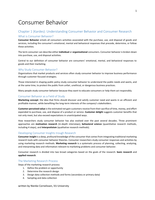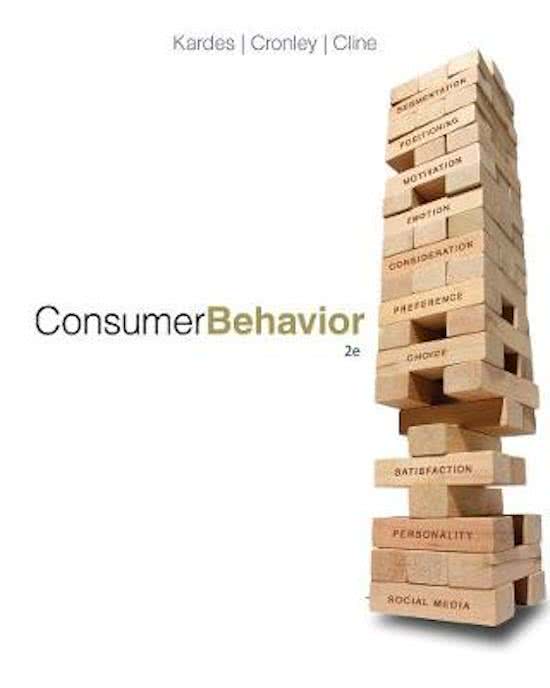1
Consumer Behavior
Chapter 1 (Kardes): Understanding Consumer Behavior and Consumer Research
What is Consumer Behavior?
Consumer Behavior entails all consumers activities associated with the purchase, use, and disposal of goods and
services, including the consumer’s emotional, mental and behavioral responses that precede, determine, or follow
these activities.
The term consumer can describe either individual or organizational consumers. Consumer behavior is broken down
into purchase, use, and disposal activities.
Central to our definition of consumer behavior are consumers’ emotional, mental, and behavioral responses to
goods and their marketing.
Why Study Consumer Behavior?
Organizations that market products and services often study consumer behavior to improve business performance
through customer-focused strategies.
Those interested in shaping public policy study consumer behavior to understand the public needs and wants, and
at the same time, to protect the public from unfair, unethical, or dangerous business practices.
Many people study consumer behavior because they want to educate consumers or help them act responsibly.
Consumer Behavior as a Field of Study
Marketing concept: the idea that firms should discover and satisfy customer need and wants in an efficient and
profitable manner, while benefiting the long-term interests of the company’s stakeholders.
Customer perceived value is the estimated net gain customers receive from their sacrifice of time, money, and effort
expended to purchase, use, and dispose of a product or service. Customer delight suggests customer benefits that
not only meet, but also exceed expectations in unanticipated ways.
How researchers study consumer behavior has also evolved over the past several decades. Three prominent
approaches are motivation research (in-depth interviews), behavioral science (quantitative research methods,
including 4 steps), and Interpretivism (qualitative research methods).
Developing Consumer Insights trough Research
Consumer insight is a deep, profound knowledge of the consumer that comes from integrating traditional marketing
research tools with consumer behavior theories. Consumer researchers study consumer responses and activities by
using marketing research methods. Marketing research is a systematic process of planning, collecting, analyzing,
and interpreting data and information relevant to marketing problems and consumer behavior.
Consumer research is divided into two broad categories based on the goals of the research: basic research and
applied research.
The Marketing Research Process
Steps of the marketing research process:
1. Define the problem or opportunity
2. Determine the research design
3. Design data collection methods and forms (secondary or primary data)
4. Sampling and data collection
written by Nienke Cornelissen, VU University






